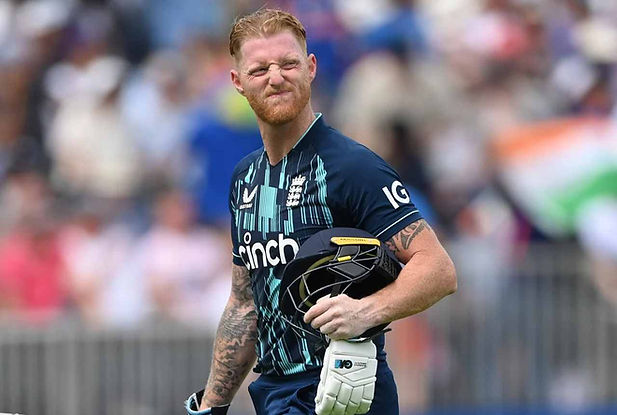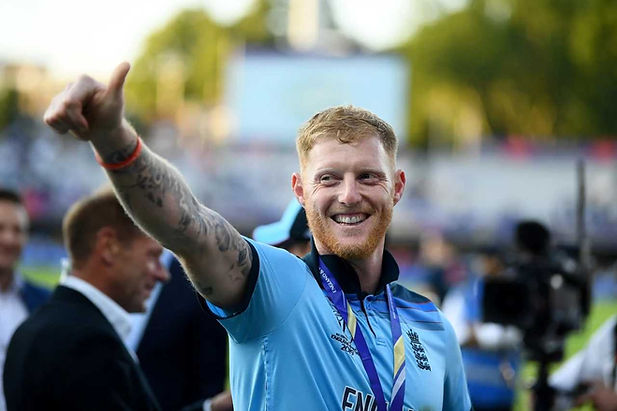Ben Stokes on retirement from One-day Internationals (ODIs) said, the schedule at the moment look all very ‘jam-packed’.

We don’t often see cricketers give up. Neither on the field nor off it. Especially not from players who are known for their never-give-up attitude. Who would have thought that the man who won his team their maiden ODI Cricket World Cup, the in-your-face, hard-hitting all-rounder Ben Stokes, would be pulling down the curtains on his ODI career at a premature age of 31? The news spread like wildfire and the cricketing world was dumbstruck but at the same time applauded Ben’s decision.
Tests and T20s going to be main focus for Stokes
Ben Stokes, England’s newly-appointed Test captain, admitted that playing all three formats was “just unsustainable for me now”, a statement which left former England captains, Nasser Hussain and Michael Vaughan, concerned as they criticised cricket’s “joke” schedule. Stokes, who is one of the core members of England’s all-format squad, was scheduled to play England’s ODI matches this summer and rest through the T20I series against India and South Africa. He also revealed that he would miss The Hundred. However, Stokes has now opted to call it quits on his ODI career, in a bid to give “everything I have to Test cricket” and “my total commitment to the T20 format,” as quoted by Stokes while talking to Sky Sports.
Nasser Hussain left no stone unturned while bashing the poor scheduling of cricket across the calendar year. “The issue is not with the ECB, Rob Key or Ben Stokes. The issue is with the schedule. If the ICC just keeps putting on ICC events, and the individual boards just keep filling in the gaps with as much cricket as possible, then eventually these cricketers will say “I’m done”. Ben Stokes is done in one format at the age of 31, which can’t be right really. The schedule needs looking at. It’s a bit of a joke at the moment, “he said while speaking to Sky Sports.
Sometimes it just hits you that you can’t do this format anymore and the only thing you are in control of is your own retirement. It’s disappointing news, to say the least. But if you’re a multi-format, multi-dimensional England Test captain like Ben Stokes, who throws himself into his job 100 per cent on and off the field, eventually something is going to have to give. It’s a reflection of where the cricketing schedule is at the moment. “It is madness for players,” Nasser added.
Vaughan suggested on Twitter after the big announcement that the cricketing chiefs should dismantle the bilateral ODI and T20I series, with all individual boards vying for calendar space for their respective leagues.
“Bilateral ODI / T20I series will have to go if all the boards around the world are desperate for there own franchise tournaments!! Something has to give.. It shouldn’t be players retiring from one format aged 31!!!” he tweeted.
Discerning the busy schedule and the players’ mental strength
It’s not just the England Cricket Board (ECB) or Cricket Australia (CA) or Cricket South Africa (CSA), it’s one and the same for all. For instance, a country like India will be playing a total of 13 series. Ten out of thirteen series will be bilateral, while the other three series include the Asia Cup, T20 World Cup 2022 and IPL 2022. As a result, the year 2022 will be the busiest in recent memory for the players. While some ICC and bilateral series are of utmost importance, the bilateral series will be important with respect to opportunities for youngsters to audition before the world cups.
India have so far played 33 international games in 2022 (prior to the West Indies tour): 16 T20Is, 9 ODIs and 5 Test matches. Of those, India have won 19 and lost in 10 matches, with a win percentage of 63.33. There is still one all-important ICC event and one1 Asia Cup remaining. If we include the “UTMOST IMPORTANT-74 matches” of the IPL, plus India’s international schedule, India would roughly be playing close to 200 days in a calendar year, which consists of 365 days. The spectators, on one hand, sitting in an air-conditioned room, sipping a cup of tea, with 105 days off with weekends and 10 days of bank holidays, work roughly around 251 days in a calendar year but there is a difference when it comes to workload of players. The ordinary people watching the game and the players playing the game do not have the same demands on their fitness, and with so much cricket going around, the only ones suffering would be the players at the end of the day.
While the cricketers suffer, the cricket boards and the management get richer and richer. With nearly 200 match days for India in a calendar year, the sponsorship money, broadcasting money, and advertising money blindfold them ever so briefly to see what the players are going through, both mentally and physically. It’s not just the match fitness the players have to worry about, but also the different conditions of the host country, the jet-lagged conditions and the foreign food, which they have to get accustomed to before even stepping a foot on the ground.
Read More: Is ‘Bazball’ New or Old? How can it reshape Test cricket?

A new era for cricket and the cricket community
Ben Stokes, who has only played just nine more ODIs since the World Cup win owing to injuries, mental health break and workload management, has scored 2919 runs in his 104-match career in the format at an average of 39.4 and picked 74 wickets.
While Ben Stokes retiring at 31 from one of the formats would still be the first of the many that are yet to be vocal about the hectic schedule. Speaking to Sky Sports, Ben had utmost clarity: “We are not cars,” he stated. “You can’t just fill us up and we’ll go out there and be ready to be fueled up again. We had a Test series and then the one-day team had a series going on at the same time that was a bit silly.”
“I just feel like there is too much cricket rammed in for people to play all three formats now. It is a lot harder than it used to be. I look back to when I used to do all three and it didn’t feel like it was as jam-packed and all that. Obviously, you want to play as much cricket as possible, but when it is making you feel tired, sore and you’ve got to look towards five or six months down the road for what you’re doing in the here and now, it is probably not the best thing,” Stokes added.
“I asked Stuart if he felt that not playing white-ball cricket was a reason he was still playing now, 160 Tests. He said, without a shadow of a doubt, yes. I want to play 140-150 Tests for England.”
“It’s come a lot earlier than I would have liked at 31 years old, giving one of the formats up. In T20s, one has to bowl twowal to three overs here and there. Hopefully, I have considered when I’m 35 or 36, still playing Test cricket, I can look back on this decision and say I’m very happy with it.”
Ben Stokes isn’t alone
Seeing from afar, it definitely isn’t just Ben Stokes who is worried about longevity owing to playing all three formats simultaneously. South Africa wicketkeeper batter, Quinton de Kock too called it quits from Test cricket in order to enhance and stay fit for ODI and T20 games. Kevin Pietersen took to Twitter to address the issue in typical KP style.
With the former and the current cricketers coming forward to address the elephant in the room, it wouldn’t be long before we see some alterations in the schedule or the formats being played. The amount of revenue cricket generates for the boards is no joke, and with so much money involved, it would just be a matter of time that we would see players calling it quits from one of the three formats. With the IPL shackling all the broadcasting bidding records, we might just see the end of bilateral series, maybe not today, maybe not even tomorrow, but maybe four to five years down the line, with franchise cricket standing tall to follow in the footsteps of the franchise football world.
Read More: New Skipper’s Impact: England begin Ben Stokes Era in Tests on victorious note

